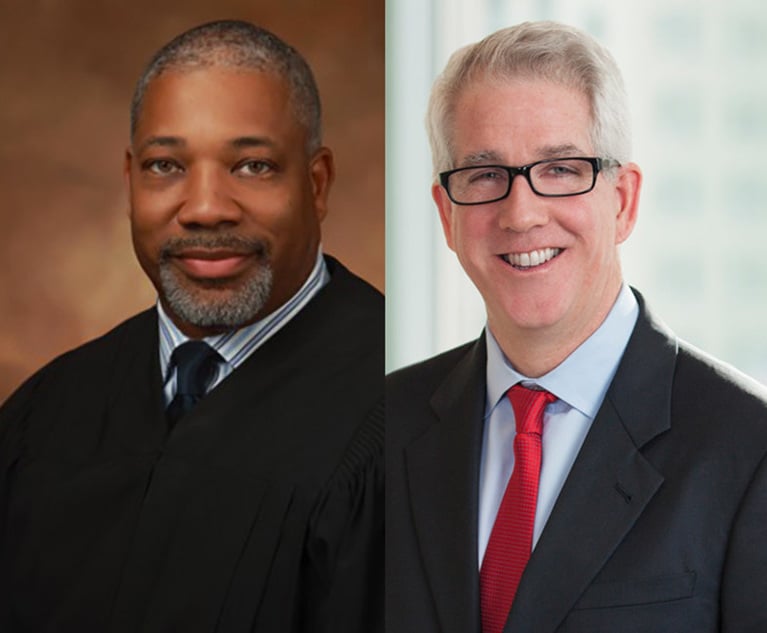 Photo: M.O. Stevens via Wikimedia Commons
Photo: M.O. Stevens via Wikimedia CommonsRite Aid Ordered to Indemnify Ex-Chief Counsel After Losing Case Against Him
Three sources of authority—Delaware law, Rite Aid's bylaws and its charter—support Franklin Brown's claim for mandatory indemnification from the drugstore chain, the Delaware Chancery Court recently ruled.
May 28, 2019 at 02:54 PM
3 minute read
The original version of this story was published on Corporate Counsel
Camp Hill-based Rite Aid Corp. must pay the legal expenses of a former top lawyer stemming from the drugstore chain's suit against the ex-executive for his role in a financial scandal at the company.
The Delaware Court of Chancery granted summary judgment in favor of Franklin Brown, Rite Aid's former executive vice president, chief legal counsel and vice chairman of its board, in an indemnification suit he brought against the company after its state court case in Pennsylvania was dismissed. That civil suit focused on Brown's alleged misdeeds in connection with an accounting scandal that led to a $1.6 billion accounting restatement in 1999.
Originally sentenced to 10 years in 2004 on several criminal charges associated with the scandal, including conspiracy to commit accounting fraud, filing false statements with the U.S. Securities and Exchange Commission and conspiracy to obstruct justice, Brown had his sentence reduced on appeal, was later resentenced and was released from prison in 2011.
Although the underlying litigation between Rite Aid and its former chief legal counsel “has a knotty history” that “spans over a decade and across several jurisdictions … the analysis on the presented facts [regarding indemnification] is straightforward. The plaintiff is undisputedly a covered person who was embroiled in a covered proceeding. And under the simple test for determining success, he prevailed,” according to Vice Chancellor Morgan Zurn's 22-plus-page opinion.
Specifically, Zurn said, Brown's claims of indemnification are supported by three sources: Delaware statute and Rite Aid's bylaws as well as its charter. The opinion did not cite the amount of money that Brown claims Rite Aid owes him in legal expenses.
“The statute, charter, and bylaws present different paths to the same place: mandatory indemnification,” she wrote.
In so ruling, Zurn rejected Rite Aid's argument that Brown is not entitled to indemnification because he raised several unsuccessful defenses before relying on a 2001 claims release clause that Rite Aid signed. It contended that Brown should have raised that defense earlier, “which would have avoided the expenses and fees incurred in pursuing other defenses,” according to the opinion.
However, in making a determination whether indemnification is mandatory, the court looks strictly at the outcome of the underlying action, “regardless of [the] path to victory,” Zurn wrote.
“Brown persuaded the [Pennsylvania state court] to dismiss those counts,” she said. “That he obtained this result based on only one technical argument presented after years of litigation does not diminish his right to mandatory indemnification.”
Brown was represented by Abrams & Bayliss, which did not immediately respond to an emailed request for comment on behalf of its client. Rite Aid was represented by Ballard Spahr, which also did not immediately respond to an emailed request for comment on the ruling.
This content has been archived. It is available through our partners, LexisNexis® and Bloomberg Law.
To view this content, please continue to their sites.
Not a Lexis Subscriber?
Subscribe Now
Not a Bloomberg Law Subscriber?
Subscribe Now
NOT FOR REPRINT
© 2024 ALM Global, LLC, All Rights Reserved. Request academic re-use from www.copyright.com. All other uses, submit a request to [email protected]. For more information visit Asset & Logo Licensing.
You Might Like
View All
Phila. Med Mal Lawyers In for Busy Year as Court Adjusts for Filing Boom
3 minute read


'Grave Matter of Serious Consequences': Why a Missouri Judge Sanctioned a Top Kirkland & Ellis Attorney
10 minute readTrending Stories
- 1New Research Study Predicts Continued Growth for Generative AI in Legal
- 2Litera Acquires Document Automation Startup Office & Dragons
- 3Patent Trolls Come Under Increasing Fire in Federal Courts
- 4Transforming Dispute Processes in Law: The Impact of Large Language Models
- 5Daniel Habib to Serve as Next Attorney-in-Charge of NY Federal Defender Appeals Unit
Who Got The Work
Michael G. Bongiorno, Andrew Scott Dulberg and Elizabeth E. Driscoll from Wilmer Cutler Pickering Hale and Dorr have stepped in to represent Symbotic Inc., an A.I.-enabled technology platform that focuses on increasing supply chain efficiency, and other defendants in a pending shareholder derivative lawsuit. The case, filed Oct. 2 in Massachusetts District Court by the Brown Law Firm on behalf of Stephen Austen, accuses certain officers and directors of misleading investors in regard to Symbotic's potential for margin growth by failing to disclose that the company was not equipped to timely deploy its systems or manage expenses through project delays. The case, assigned to U.S. District Judge Nathaniel M. Gorton, is 1:24-cv-12522, Austen v. Cohen et al.
Who Got The Work
Edmund Polubinski and Marie Killmond of Davis Polk & Wardwell have entered appearances for data platform software development company MongoDB and other defendants in a pending shareholder derivative lawsuit. The action, filed Oct. 7 in New York Southern District Court by the Brown Law Firm, accuses the company's directors and/or officers of falsely expressing confidence in the company’s restructuring of its sales incentive plan and downplaying the severity of decreases in its upfront commitments. The case is 1:24-cv-07594, Roy v. Ittycheria et al.
Who Got The Work
Amy O. Bruchs and Kurt F. Ellison of Michael Best & Friedrich have entered appearances for Epic Systems Corp. in a pending employment discrimination lawsuit. The suit was filed Sept. 7 in Wisconsin Western District Court by Levine Eisberner LLC and Siri & Glimstad on behalf of a project manager who claims that he was wrongfully terminated after applying for a religious exemption to the defendant's COVID-19 vaccine mandate. The case, assigned to U.S. Magistrate Judge Anita Marie Boor, is 3:24-cv-00630, Secker, Nathan v. Epic Systems Corporation.
Who Got The Work
David X. Sullivan, Thomas J. Finn and Gregory A. Hall from McCarter & English have entered appearances for Sunrun Installation Services in a pending civil rights lawsuit. The complaint was filed Sept. 4 in Connecticut District Court by attorney Robert M. Berke on behalf of former employee George Edward Steins, who was arrested and charged with employing an unregistered home improvement salesperson. The complaint alleges that had Sunrun informed the Connecticut Department of Consumer Protection that the plaintiff's employment had ended in 2017 and that he no longer held Sunrun's home improvement contractor license, he would not have been hit with charges, which were dismissed in May 2024. The case, assigned to U.S. District Judge Jeffrey A. Meyer, is 3:24-cv-01423, Steins v. Sunrun, Inc. et al.
Who Got The Work
Greenberg Traurig shareholder Joshua L. Raskin has entered an appearance for boohoo.com UK Ltd. in a pending patent infringement lawsuit. The suit, filed Sept. 3 in Texas Eastern District Court by Rozier Hardt McDonough on behalf of Alto Dynamics, asserts five patents related to an online shopping platform. The case, assigned to U.S. District Judge Rodney Gilstrap, is 2:24-cv-00719, Alto Dynamics, LLC v. boohoo.com UK Limited.
Featured Firms
Law Offices of Gary Martin Hays & Associates, P.C.
(470) 294-1674
Law Offices of Mark E. Salomone
(857) 444-6468
Smith & Hassler
(713) 739-1250





